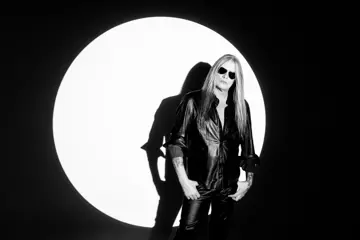The Turbine Platform can be an awkward location in which to hold a ticketed concert, set as it is in the open centre of the Powerhouse. To create a private space, giant black curtains have been drawn around the platform, blocking the visual aspect of tonight's performance from prying eyes; although with the lights dimmed and no real performance to speak of, this is a fairly token gesture. But while it doesn't do much for the outside, the interior is transformed into a much more intimate space, particularly as the large audience filters in.
Setting aside the frequent vocal elements of Quarantine, and indeed the structured songs of her recordings, Laurel Halo elects instead for a set of mutating electronics – squelchy synth pads and clipped beats running into a bass so deep and heavy that it overwhelms everything else. Drum patterns run intentionally off-beat, arpeggios loop too long, and in the right environment it might have created the sort of hypnotic trance that can come from intricate minimal techno. Unfortunately the space itself and the low volume works against the artist. The top-end is particularly quiet and largely lost in the wide-open room and, without its intricacies clearly audible, the music ends up feeling hollow and repetitive too often. There are definitely moments of clarity, where the elements all hold together and the crowd starts to move, but not enough of them over her hour running time. Strangely enough the mix seems better on the way to the bar, outside of the performance space, the bass no longer as overriding and the treble more prominent.
Objekt's set is more that of a DJ, rather than Laurel Halo's live creation, but buoyed by a substantial rise in volume 15 minutes in, it seems much livelier and a lot more straightforward. There is a brief settling-in period during which there are a few glitches in the mixing, but by-and-large it's a solid slice of down-tempo techno, which only gets better as it continues. There's a steady enough beat to keep people dancing and a slow, almost imperceptible, build that works to a satisfying conclusion. The Powerhouse isn't a perfect venue for this sort of music though – too formal, too self-conscious. And the concentration implied by the venue and staging that works wonders for the sort of sound art that Room40 typically presents can create a disparity when the music is designed to produce movement rather than reflection. Whether it's that disparity, or the fact it's a school night, the crowd doesn't seem captured by the music, filtering out over the course of the two sets until there's only an enthusiastic fraction of the original audience left as the show closes.















